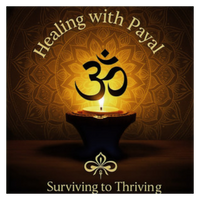Navigating the Waves of Anxiety: Insights and Coping Strategies from My Journey
- HealingWithPayal

- Jun 9, 2025
- 3 min read
Updated: Jun 21, 2025
Anxiety affects millions of people worldwide, yet it remains frequently misunderstood. Whether you feel anxious before a big presentation or find it challenging to manage daily stressors, it's important to know you are not alone. This blog aims to provide insights into anxiety, how it manifests, and some coping strategies that have helped me along my journey.
What is Anxiety?
Anxiety is your body and mind's natural reaction to stress. It becomes a problem when it feels constant and overwhelming. Some common signs of anxiety include:
Excessive worry or fear: This could manifest as always anticipating catastrophe, even in minor situations. Studies show that nearly 31% of adults experience anxiety at some point in their lives.
Difficulty sleeping or concentrating: About 70% of adults with anxiety report sleep issues, which can worsen feelings of fatigue and irritability.
Restlessness or physical symptoms: Many experience a racing heart, sweaty palms, or nausea during anxious moments.
Feeling out of control or emotionally exhausted: It's common to feel drained when anxiety becomes a constant companion.
Recognizing how anxiety appears in our lives is key. Everyone experiences it differently, and understanding those differences is part of the journey toward effective coping.
My Personal Journey
There were times when anxiety darkened my world. I would second-guess every decision, shy away from social situations, and feel as though I was failing at life. It was exhausting. I vividly recall nights spent overthinking every word I had spoken that day, my mind racing like I was trapped in a relentless cycle.
Gradually, through self-reflection, I started untangling these emotions. I began to notice specific triggers — such as crowded places or tight deadlines — and learned to recognize the patterns in my thinking. Instead of battling against my anxiety, I learned to embrace these feelings as a part of my experience. This shift was incredibly liberating.
I am not a therapist, but my journey through reading, self-analysis, and personal experiences provided me with helpful tools. I want to share what I’ve learned, hopeful that it may assist you on your path.
5 Tools That Helped Me Cope
Breathing Exercises
Slow, deep breathing became my first tool during moments of anxiety. It calms the mind and body, providing an anchor when everything else feels chaotic. Try inhaling for 4 counts, holding for 4 counts, and exhaling for 6 counts. This method not only reduces anxiety but can also lower blood pressure and improve oxygen flow. Engaging in this practice for just five minutes can make a noticeable difference.

Grounding Techniques
When anxious thoughts spiral, grounding techniques can be lifesavers. I focus on my senses - focus on 5 things I can see, hear, touch, smell, and taste. This simple exercise brings my awareness back to the present. For instance, if I sit in a park, I’ll identify the colors of the leaves, the sounds of nearby birds, and even the warmth of the sun. This practice has proven essential in calming my mind and reassuring me that I am safe.
Journaling
Writing has always acted as a refuge. Journaling allows me to spill my thoughts onto the page without fear of judgment. I often write about my day, my feelings, or even use prompts to explore deeper emotions. For example, if I feel overwhelmed, I’ll list what’s causing that anxiety, along with three potential solutions. This approach not only clarifies my thoughts but also lightens my emotional burden.
Gentle Movement
Physical activity acts as a powerful antidote to anxiety. Engaging in gentle movement, whether it’s a calming walk in the park or a restorative yoga class, can release tension built up in the body. Research indicates that even just 30 minutes of exercise can significantly lower symptoms of anxiety. I find that stepping outside and feeling the fresh air helps lift my spirits instantly.
Talking to Someone
Connection is vital. Sharing my feelings with trusted friends or family has been healing. Conversations not only provide comfort but also remind me I am not alone. A 2015 study highlighted that discussing one’s feelings with a confidant can lower stress levels significantly. Do not hesitate to reach out when you feel overwhelmed; your voice matters.
Moving Forward with Hope
Anxiety may be a part of our experiences, but it does not have to define who we are. By understanding our feelings and applying effective coping strategies, we can navigate the waves of anxiety with resilience.
If you're facing struggles, remember that support exists. Many people walk this path, and seeking help is a sign of strength. These tools are starting points. Each person's journey is unique, and finding what works for you is essential.
Together, we can break the stigma surrounding anxiety and create a supportive community. Here’s to your journey toward healing, understanding, and peace.





Comments